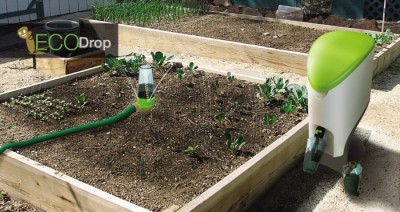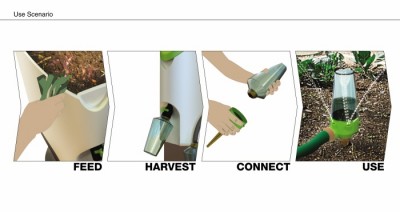The Eco-Drop is a concept to use the liquids that worms produce from breaking down waste food as a fertilizer for a garden. The concept helps to prevent harmful chemicals entering the food chain and to prevent water contamination. It also helps to recycle a households food waste into an effective fertilizer for a garden.
The Eco-Drop concept has been designed by Seung Kim to help combat the problems of water contamination and to help reduce the amount of household waste going to landfill. The Eco-Drop would work by using worms to break down organic matter waste (like left over food, vegetable peelings etc). Worms would feed on this waste which would be placed with them into the main chamber of the device. As the worms feed, they excrete the digested matter and break the matter down.
This creates a liquid or worm juice that makes a great fertilizer for a garden. Many use worms to help break down their waste for composting currently. The difference with this concept is that it allows you to make use of the rich fertilizing liquid cleanly and easily. The Eco-Drop allows you to use this fluid as a fertilizer when watering a garden through a sprinkler system. The device hopes to take out the effort in using this form of fertilizer, there is no heavy lifting, no hard work like that of covering the ground in more compost and there is no messy extraction of the fluid. To use the worm juice you simply fill a cup like part of the device with the fluid from a nozzle located at the bottom of the main chamber, the cup part then attaches to the sprinkler part to allow you to water the garden with a worm juice and water mix.
Chemical fertilizers can cause a lot of damage to the ecosystem. The chemicals find their way down into the water table and are washed into drains which can lead into rivers and lakes. The fertilizers change the natural balance of these water habitats and can cause devastating results. The worm juice though is a natural product, that will not effect the ecosystem in the same way. It also helps to reduce down the amount of waste a household would send to landfill and could help to encourage a household to grown some of their own foods. The concept would not require any long term running costs while providing you with a useful resource for your garden.
Source: iGreenSpot



